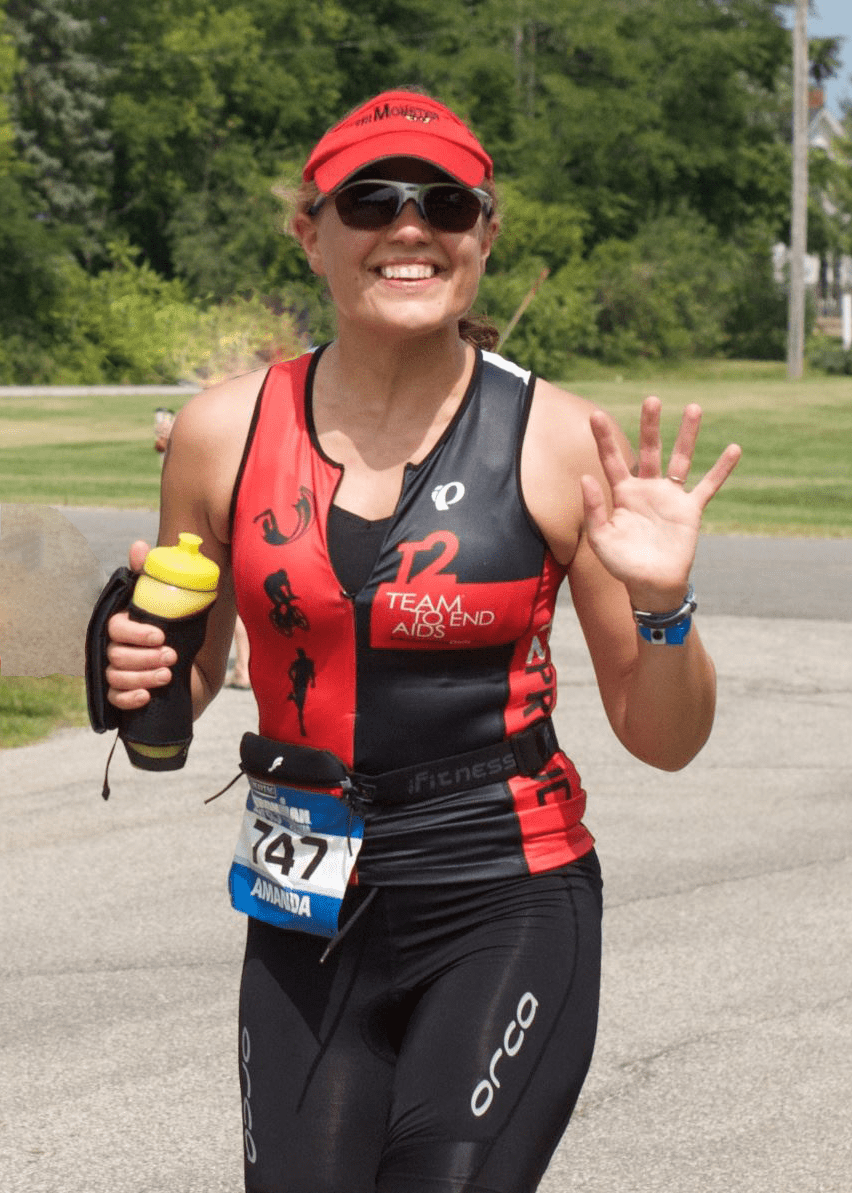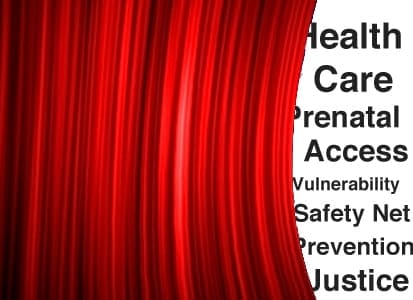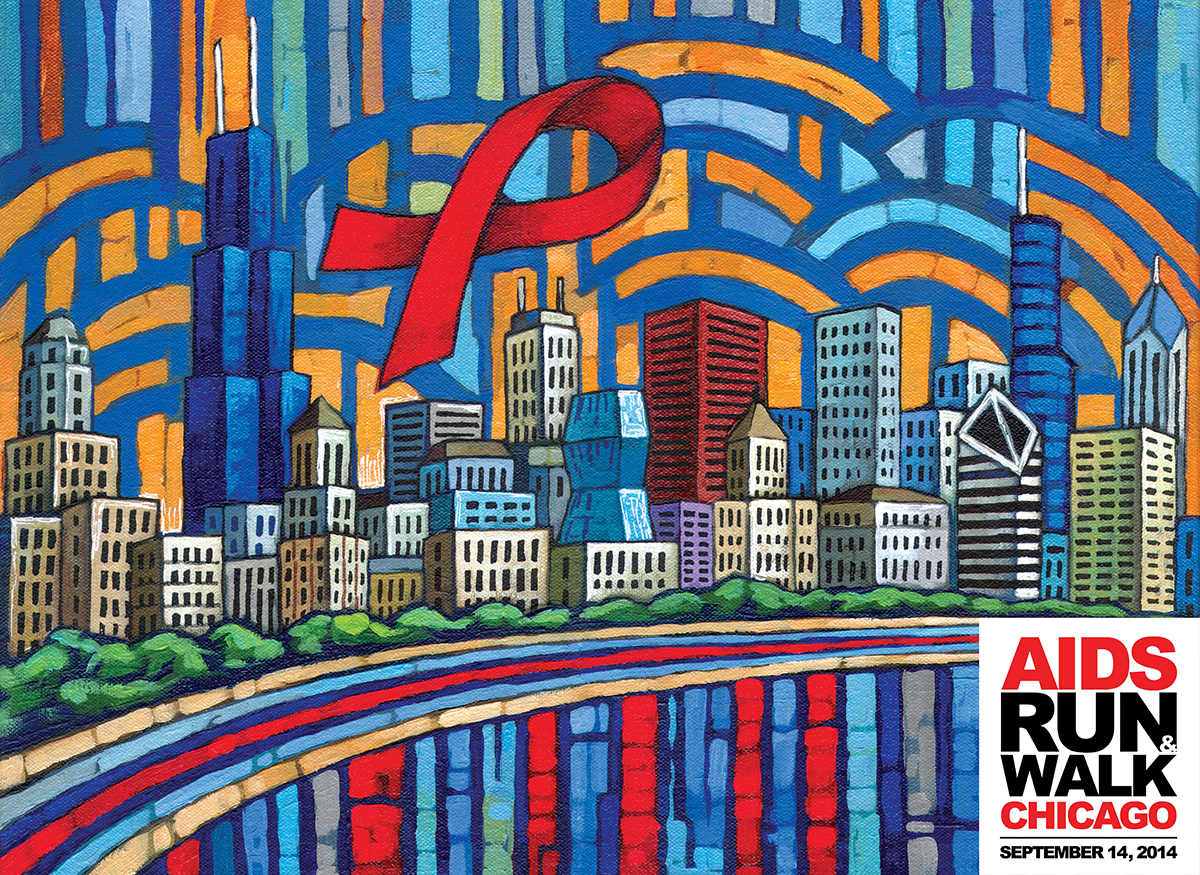By Mia Caballero
I started my social media internship at AIDS Foundation Chicago (AFC) in January of 2020, a few months before most staff started working remotely. I am extremely grateful to have had two months to get to know some staff and attend in-person meetings like the Annual Meeting. Because a lot of the work I do is online, it wasn’t too hard to transition to working from home. Still, I do really miss my commute to the office and being able to pop by colleagues’ desks just to talk.
The many changes that the COVID-19 pandemic prompted taught me a lot about myself. As it pertains to work, I’ve learned that just because you’re remote it doesn’t mean you never need a break. I’ve found it difficult to schedule out time for myself to eat when I’m doing work or school, so I’ve been trying to work on time management. These changes also taught me to love my own company. As an introvert, I didn’t really struggle with having to stay inside because it gave me the best excuse I could ever ask for to not go anywhere. But still, I learned how to enjoy time with myself whether it be learning new Tik Tok dances with my sisters or developing my new plant obsession.
As I’m sure this year has affected us all in a variety of ways, I checked in with seven different staff members at AFC to see how the COVID-19 pandemic has impacted their time at AFC, and what they’ve learned from this year of isolation.
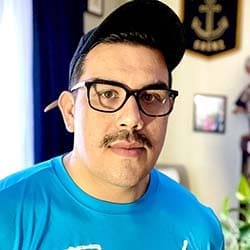 Erwin Saenz
Erwin Saenz
Director of Corporate and Foundation Relations
Has been at AFC for 10 months.
“COVID has impacted every step of my journey with AFC. At the start of the pandemic, I began my interview process; I recall asking my friends if they thought I needed to wear pants with my suit during my first Zoom interview.
Once I accepted the job, I had to figure out how to move from Seattle to Chicago. That was a journey! Traveling across half the country to a new location gave me lots of time to think about little things like “how will I even get my work computer?” The only first-day hiccups involved me explaining that I had bleached my hair at the beginning of the stay-at-home orders and couldn’t get a haircut.
The realization that the folks that fund our organization would have an intimate view of my home was shocking at first. Gone was the comfort of a conference room and the formalities that come with an office setting. I learned COVID-19 presented an opportunity to develop authentic, meaningful conversations with my stakeholders. One of my favorite discussions involved a corporate partner and I summarizing the Mariah Carey autobiography for over an hour; those type of interactions would never happen in person!
Realizing that COVID-19 would be affecting us for longer than we thought motivated me to learn new ways to form connections with my friends and family. During the first months of quarantine, I started a podcast, streamed my weekly live DJ sessions, and learned how to make resin crafts. I used these new skills to build a community to raise funds for various mutual aid funds.”
 Kennedy Brookins
Kennedy Brookins
Community Outreach and Education Specialist
Has been at AFC almost 9 months.
“COVID has completely shaped my time at AFC. I haven’t seen any of my coworkers in person and have only been to the office a handful of times. Working from home and doing community outreach remotely has been my normal, so I think it’s going to be a huge adjustment for me to have to go back to the office one day and re-learn how to do my job.
I’ve learned that institutions and organizations are capable of so much more than they have let on in the past, and because of that I’m less likely to accept no as an answer. I feel like I’ve been given the runaround in the past on why certain things at nonprofits are not possible. These same organizations were able to adapt so quickly when the pandemic hit. Not to say that we should work from home forever, but a lot of the ‘new ways’ of life are actually things that have been asked for by employees and activists for years. Innovation is possible, new voices are necessary and, quite frankly, tradition is overrated and ineffective.”
 Sacha Urban
Sacha Urban
Director, Individual & Planned Giving
Has been at AFC for 3 1/2 years.
“I purposely took a downtown job after my daughter graduated from high school and tremendously enjoyed the commute on the train, which allowed me to knit and listen to music or books on tape. It has been an adjustment for me to consistently work from home. I much prefer the office where I can focus solely on my work and interact with my co-workers and of course, with AFC’s donors and constituents.
As an extrovert, I thrive in interactions with living beings/things (I guess that’s why I added so many houseplants over past year, from zero to 10). I love the arts, the exchange of ideas and energies. I only can knit, bake, watch Netflix and reorganize my closet so much.
The earth definitely took a breather, in terms of environment. I spent significant time with my mother in Switzerland — and we literally gave each other new life energy. I started to do yoga (Yoga with Adriene). I learned to make and bake sourdough bread. My garden last summer never looked so beautiful, and I pickled cucumbers for the first time.”
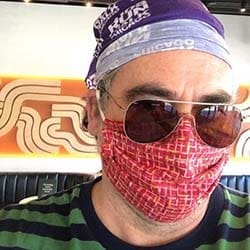 Jim Pickett
Jim Pickett
Senior Director of Prevention Advocacy and Gay Men’s Health
Has been at AFC roughly 17 years.
“Prior to COVID-19, my job had me on the road a lot, sometimes around 100,000 miles a year attending conferences and meetings all over the world. When I wasn’t in other cities, much of my time in Chicago was spent out of the office leading trainings and workshops and helping implement the many conferences AFC does. So, when COVID-19 came, all of that ended immediately.
While I have gotten more comfortable using Zoom and other virtual platforms to engage in advocacy, research and educational projects, I really do miss connecting with people in the ‘real world’ and catching up with far-flung colleagues. Zoom doesn’t take the place of running into a ‘partner in crime’ at a conference and plotting over a quick coffee. Some of my most exciting projects have been hatched in hotels and conference centers.
I’d say that being forced to slow down and not being on the run all the time has helped me appreciate, or should I say better appreciate, the value of home, spending time with my partner, being more accessible to my family and community. Checking in and out of hotels means you miss a lot of things, big and small, that really matter.”
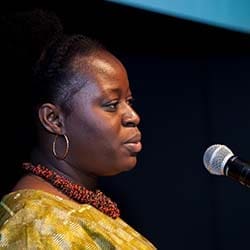 Bashirat Olayanju
Bashirat Olayanju
Vice President of Care
Has been at AFC for 9 years.
“I have not been able to connect with my peers as much as I had in the past. I have a tight knit team, and it’s been a huge adjustment only communicating with them through video, email and chat. It is good to know that work can still be done as efficiently when working remotely, and AFC has been able to provide multiple tools that have been beneficial to make remote work seamless. We have also been able to provide direct services in a different way which we have found to be beneficial for many clients who would rather not have in-person interactions.
Tomorrow is not guaranteed. Hold your family close, your friends, and your support system close — be very intentional about your words to them. My family is spread around multiple states and countries, and not all resources were/are equal across each location. A lot more work is needed as it pertains to health equity. More Black and Brown folks had negative health outcomes compared to white folks as with everything else.”
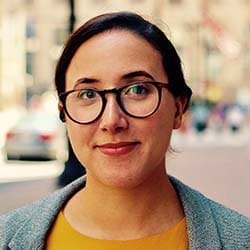 Nora Bouacha
Nora Bouacha
Senior Manager of Research and Evaluation
Has been at AFC for about 1 ½ years.
“I started about 6 months before COVID, so I feel like I was pretty fortunate to be able to get a good understanding of the organization and the projects I work on before everything changed. I am also grateful that I at least got the chance to meet and get to know my colleagues in-person before everything moved to Zoom.
As far as what has changed — my work requires managing multiple research and evaluation projects. As part of that, we recruit participants and meet with project clients to administer assessments, all of which were primarily conducted face-to-face before the pandemic. This allowed us to meet people at locations that were convenient to them, and took into account the fact that not everyone has a phone or access to the internet. During the quarantine, we had to shift everything to remote data collection. This was definitely a big adjustment, but luckily my team has gone above and beyond in order to make this happen — dropping off research incentives in person and coordinating with case managers to make sure we were still able to access clients at times and using methods that were feasible for them.
Routines are important! I (eventually) learned that there needs to be some separation between work and home, even when you are working from home, so I started doing some small things to book-end the workday. Every morning I make a French press coffee and once that is done brewing, I know it is time to start work. At night I usually start cooking dinner right after I send my last email for the day. This has helped me to maintain a reasonable work-life balance. It’s still a struggle though.”
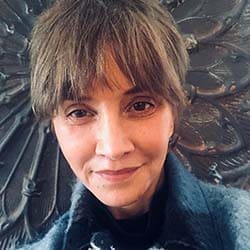 Carolyn Bloom
Carolyn Bloom
Substance Use Care Coordinator
Has been with AFC/CHH for almost 3 years.
“COVID has impacted my clients profoundly since I do direct service and provide harm reduction counseling and support to people who use drugs. Our clients generally are under-resourced, stigmatized and without consistent access to basic needs. The pandemic has made that much worse with connections disrupted and overdose deaths skyrocketing.
Working in direct service can also be isolating for me. My one-time weekly day in the office allowed me to feel connected to AFC/CHH and my co-workers — I really miss that. What I’ve learned since COVID is that we have a lot that needs to be fixed!”

